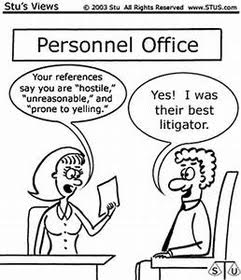 If anyone is looking for evidence that the background and reference check are still worthwhile, look no further than the current headlines around the ongoing Supreme Court nomination process in the US. Suddenly we are witnessing, in real time, a job interview that has now evolved into something resembling a full-blown investigation of the potential candidate’s personal suitability and allegations of violence in his past. Given the extremely high stakes, shouldn’t adequate due diligence have been conducted before the nomination?
If anyone is looking for evidence that the background and reference check are still worthwhile, look no further than the current headlines around the ongoing Supreme Court nomination process in the US. Suddenly we are witnessing, in real time, a job interview that has now evolved into something resembling a full-blown investigation of the potential candidate’s personal suitability and allegations of violence in his past. Given the extremely high stakes, shouldn’t adequate due diligence have been conducted before the nomination?
The difference between the professional reference versus personal or character reference check.
In the past, I have written about the importance of taking the time to do a reference check after a job applicant has done well during an interview — before finalizing a hiring decision. In that article, I focused on making sure that the candidate was competent and reliable in terms of the role they were being hired for. This usually includes speaking with former employers and/or co-workers, and verifying any essential credentials (e.g., designations, diplomas, degrees, etc.). The reference check process can seem like a trivial formality – until you start discovering red flags.

Brett Kavanah and Clarence Confirmations (Tomas Chip Somodevilla REUTERS and J. David Ake AFP Getty)
As I’ve said before, the devil is in the details when it comes to examining what kind of person you are allowing into your work environment. Finding a job candidate who has the right work experience, knowledge and experience is a wonderful thing. When it happens, it’s smart to extend an offer of employment promptly. But the presence of hard skills (e.g., technical skills, knowledge, and relevant work experience) shouldn’t be the only hiring criterion. Soft skills are just as vital to make sure your job applicant will work well and … work well with others. In many professional roles, once a certain threshold of competence has been determined (including experience, education, credentials, etc.) soft skills are essential and often determine who will excel on the job. Simply put, soft skills are the tools that we use to apply our knowledge, skills, and abilities. They include things like initiative, interpersonal skills, empathy, and judgement. Most employers do a much better job at assessing knowledge and experience during the hiring process than they do evaluating soft skills. The reference check, when done well, is a useful tool for confirming the presence of adequate soft skills, personal suitability, and character.
Most organizations want to avoid the reputational damage that comes along with hiring someone who has a violent, unsavoury, or criminal past. For sensitive roles, even the appearance of these problems in a person’s background may disqualify someone from being appointed to a position of trust. Even if the problems remain internal to your organization, hiring someone who has a history of threatening, bullying or harassing behaviour is extremely risky in today’s climate where transparency and accountability are required more and more. Abusive and/or corrupt behaviours hurt your organizational culture and in the long term, they undermine the bottom line. My intent here is not to label any public figure as a corporate psychopath, but there’s no doubt that certain high profile appearances and testimonies suggest the presence of dark and disturbing qualities at the highest levels of political and corporate power. When these televised public appearances provide examples of a job candidate’s rage and disrespect it is plausible to anticipate problematic interpersonal relationships in pressure-filled, high stakes and private work environments.
Need help dealing with a delicate or high-stakes HR or career issue? I invite you to contact me privately. I offer a free 15 to 20-minute initial consultation by phone. Or, if you prefer, you can contact me by email, or via direct message on Twitter, Facebook, or LinkedIn. If something urgent comes up, I’m also available by a voice or video on Magnifi, an expertise-on-demand app.
More than career coaching, it’s career psychology®.
I/O Advisory Services – Building Resilient Careers and Organizations.
Easily share this article using any of the social media icons below.




